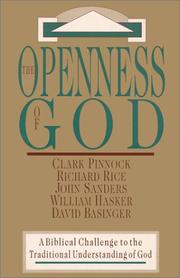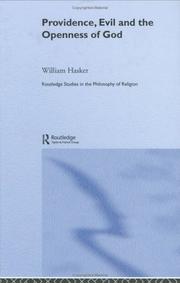| Listing 1 - 10 of 15 | << page >> |
Sort by
|
Book
ISBN: 0830839380 9780830839384 9780830852864 0830852867 Year: 2020 Publisher: Downers Grove, Illinois
Abstract | Keywords | Export | Availability | Bookmark
 Loading...
Loading...Choose an application
- Reference Manager
- EndNote
- RefWorks (Direct export to RefWorks)
"Evangelical theology has grappled with open theism and its alternative doctrine of God for decades. Richard Rice recounts the history of open theism from its antecedents and early developments to its more recent expressions, considering how it might continue to develop in relation to several primary doctrines of the Christian faith"--

ISBN: 9780830818525 0830818529 Year: 1994 Publisher: Downers Grove: InterVarsity Press,
Abstract | Keywords | Export | Availability | Bookmark
 Loading...
Loading...Choose an application
- Reference Manager
- EndNote
- RefWorks (Direct export to RefWorks)
Book
ISBN: 9781009349390 1009349392 9781009494816 9781009349383 1009349368 Year: 2024 Publisher: Cambridge Cambridge University Press
Abstract | Keywords | Export | Availability | Bookmark
 Loading...
Loading...Choose an application
- Reference Manager
- EndNote
- RefWorks (Direct export to RefWorks)
This Element shows Open theism as a monotheist model of God according to which the future is objectively open-ended, not just from the finite perspective of creation, but from God's perspective as well. This Element has three main sections. The first carefully defines open theism, distinguishes its major variants, compares it to other monotheistic models, and summarizes its history. The second develops biblical and philosophical arguments for open theism against its main rivals, emphasizing a novel philosophical argument that a causally open future must also be ontically, alethically, epistemically, and providentially open as well. The third responds to common objections against open theism related to perfect being theology, the ethics of risk-taking, biblical prophecy, and theological tradition.
Open theism. --- Theism.
Book
ISBN: 9781451492392 1451492391 9781506416878 Year: 2016 Publisher: Minneapolis Fortress Press
Abstract | Keywords | Export | Availability | Bookmark
 Loading...
Loading...Choose an application
- Reference Manager
- EndNote
- RefWorks (Direct export to RefWorks)
"A particularly nettlesome question is that around the relationship of the confession of God as a simple yet threefold being -- the treatises of the one God and the Trinity. Although God as simple and Triune was widely accepted for over a millennium, simplicity has been widely critiqued and rejected by modern theology. The purported error is in conceiving God's unity prior to the Triune persons, an error begun by Augustine and crystallized in Aquinas. The Perfectly Simple Triune God challenges this critique and reading of Aquinas as a misunderstanding of his doctrine of God. By refusing to begin theology with God's oneness, who God is collapses into who God is for us, a loss of the biblical and dramatic character of God for us. D. Stephen Long posits that the two treatises were never independent, but inextricably related and entailing one another. Long provides a constructive rereading of Thomas Aquinas, tracing antecedents to Aquinas in the patristic tradition, and readings of him through to the Reformers, taking into account challenges to the classical tradition posed by modern and contemporary theology and philosophy to offer a robust articulation of divine Trinitarian agency for a contemporary age that adheres to broadly considered orthodox and ecumenical parameters."--
Trinity --- Open theism --- History of doctrines --- Thomas,
Book
ISBN: 9783374051021 3374051022 Year: 2018 Publisher: Leipzig Evangelische Verlagsanstalt
Abstract | Keywords | Export | Availability | Bookmark
 Loading...
Loading...Choose an application
- Reference Manager
- EndNote
- RefWorks (Direct export to RefWorks)
Back cover: Ewigkeit gehört zum unbestrittenen Grundbestand christlicher Glaubensreflexion. Umstritten ist dagegen, welche Auffassung von Ewigkeit angemessen ist. Ihre Gleichsetzung mit dem Prädikat der Unwandelbarkeit ist seit Hegels dialektischer Dynamisierung des Gottesgedankens nicht mehr selbstverständlich. Spätestens der Prozesstheismus und der Open-View-Theismus haben einen neuen Standard gesetzt, der in der heutigen Theologie nicht mehr unterschritten werden kann: Um die Wirklichkeit Gottes im Einklang mit der spätmodernen Kultur und den aktuellen Ergebnissen wissenschaftlicher Forschung rational verantwortbar konzeptualisieren und vermitteln zu können, bedarf es einer grundlegenden Revision der überkommenen Rede von der Unwandelbarkeit Gottes. Dieser Herausforderung haben sich die Autoren des vorliegenden Bandes gestellt.
God --- Process theology --- Open theism --- Eternity --- Omniscience --- Immutability --- Hegel, Georg Wilhelm Friedrich.
Book
ISBN: 9781481314084 1481314084 Year: 2021 Publisher: Waco, Texas Baylor University Press
Abstract | Keywords | Export | Availability | Bookmark
 Loading...
Loading...Choose an application
- Reference Manager
- EndNote
- RefWorks (Direct export to RefWorks)
"Provides an assessment of the roots, methods, claims, and significance of Open Theism in North American evangelicalism, in conversation with contemporary German theology"--
Open theism --- Free will and determinism --- God (Christianity) --- Religious aspects --- Christianity --- Omniscience --- Omnipotence
Book
ISBN: 0773421955 9780773421950 9780773438040 0773438041 Year: 2009 Publisher: Lewiston Edwin Mellen Press
Abstract | Keywords | Export | Availability | Bookmark
 Loading...
Loading...Choose an application
- Reference Manager
- EndNote
- RefWorks (Direct export to RefWorks)
This book brings together the themes of the doctrines of Providence and Trinity. Utilizing the contemporary evangelical debate regarding Open Theism as a context for this work brings a trinitarian perspective to bear on issues of the divine/human relationship that are intrinsic to Providence. Focusing particularly upon the nature of God's transcendence, sovereignty, immutability, and impassibility, this study completes its trinitarian treatment by applying what has been learned to the nature and practice of prayer as it pertains to Providence.
Good and evil -- Religious aspects -- Christianity. --- Good and evil. --- Providence and government of God. --- Theodicy. --- Providence and government of God --- Trinity --- Open theism --- Christianity

ISBN: 0415329493 Year: 2004 Volume: 3 Publisher: London Routledge
Abstract | Keywords | Export | Availability | Bookmark
 Loading...
Loading...Choose an application
- Reference Manager
- EndNote
- RefWorks (Direct export to RefWorks)
Free-will theism --- God [Open view of ] --- God [Openness of ] --- Neotheism --- Open theism --- Open theïsme --- Open view of God --- Openness of God --- Openness theology --- Theism [Open ] --- Théisme ouvert --- God, Open view of --- God, Openness of --- Theism, Open --- Theology, Doctrinal
Book
ISBN: 1608991059 9781608991051 Year: 2010 Publisher: Eugene, Oregon Wipf & Stock Publishers
Abstract | Keywords | Export | Availability | Bookmark
 Loading...
Loading...Choose an application
- Reference Manager
- EndNote
- RefWorks (Direct export to RefWorks)
Christianity and culture --- Emerging church movement --- Identification (Religion) --- Identity (Philosophical concept) --- Incarnation --- Mission of the church --- Ontology --- Open theism --- Other (Philosophy) --- Postmodernism --- Social gospel --- Religious aspects --- Christianity --- Jesus Christ --- Mystical body.
Book
ISBN: 0567681696 0567663817 9780567663795 0567663795 9780567663801 9780567663818 0567663809 9780567663801 9780567681690 Year: 2015 Publisher: London Bloomsbury T&T Clark
Abstract | Keywords | Export | Availability | Bookmark
 Loading...
Loading...Choose an application
- Reference Manager
- EndNote
- RefWorks (Direct export to RefWorks)
The contributions to this volume reflect upon changing paradigms within biblical scholarship, and in how biblical scholarship is taught. Taken together, they offer a multifaceted and informative indication of how open-mindedness in one's approach can yield fascinating results across the study of the Old Testament/Hebrew Bible. The range in topic of the contributions is exemplified in the difference between the first chapter, which works from the personal anecdote of the changing opinion of its author to make a wider point about models for Pentateuchal formation, and the third chapter, which comments on the current state of the study of ancient Israel in universities today. Other contributions include; an essay on the subject of space as a social construct in Isaiah 24-27; civil courage and whether the Bible allows room for protest; the question of monotheism in Persian Judah; the historical Ezra, and the telling of the story of Joseph (Genesis 50: 15-21) in children's Bibles in the Netherlands. The contributors include Hugh Williamson, Ehud Ben Zvi, Rainer Albertz, Karel von der Toorn, and Christoph Uehlinger
Freethinkers. --- Free thinkers --- Rationalists --- Bible --- Criticism, interpretation, etc. --- Theology. --- Open theism. --- Bible. --- Free-will theism --- God, Open view of --- God, Openness of --- Neotheism --- Open view of God --- Openness of God --- Openness theology --- Theism, Open --- Theology, Doctrinal --- Antico Testamento --- Hebrew Bible --- Hebrew Scriptures --- Kitve-ḳodesh --- Miḳra --- Old Testament --- Palaia Diathēkē --- Pentateuch, Prophets, and Hagiographa --- Sean-Tiomna --- Stary Testament --- Tanakh --- Tawrāt --- Torah, Neviʼim, Ketuvim --- Torah, Neviʼim u-Khetuvim --- Velho Testamento
| Listing 1 - 10 of 15 | << page >> |
Sort by
|

 Search
Search Feedback
Feedback About UniCat
About UniCat  Help
Help News
News